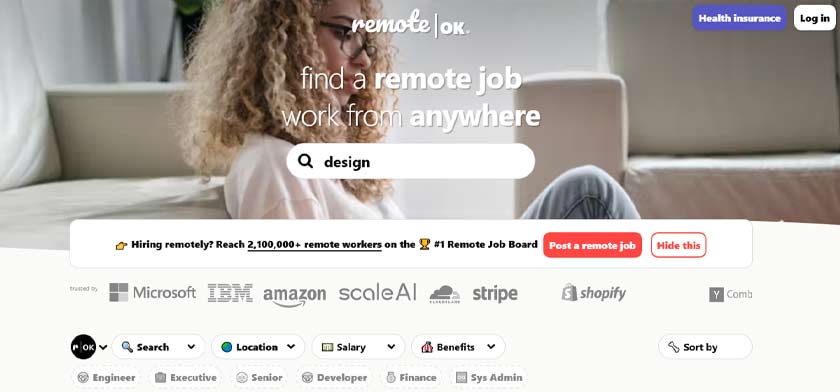Top 23 Best High-Paying Remote Jobs in 2025

Remote jobs may be 32% of the global workforce by 2025. Some pay six figures or more. It’s true—remote work isn’t just a perk anymore; it’s a career revolution. Companies worldwide are offering high salaries for skilled pros who can deliver results from anywhere.
I’ve built a thriving career in internet marketing. I’ve seen how remote work can transform your career and your lifestyle. The benefits are clear. No long commutes. You can design your workday.
But let’s be real—finding a high-paying remote job can feel overwhelming with so many options. That’s why I’ve put together this guide. In it, you’ll discover the 23 best remote jobs for 2025, the industries offering them, and insider tips on landing these roles. Ready to turn your skills into a lucrative remote career? Let’s jump in!
What is a High-Paying Job?
A high-paying job is exactly what it sounds like—a role that compensates you well for your skills, expertise, and contributions. But it’s not just about the numbers on your paycheck. These jobs often offer perks. They include flexible schedules, growth, and top benefits.
In the fast moving world, high-paying jobs focus on specialized skills. They require a mix of technical expertise, problem-solving, and communication skills. If you can bring value to the table, companies are willing to pay top dollar—no matter where you’re located.
Top 23 High-Paying Remote Jobs
Here’s where it gets exciting—these are some of the best remote roles in 2025 that offer high salaries, flexibility, and opportunities to excel in your career.
1. Software Engineer

Being a software engineer is like being a modern-day builder, except your tools are lines of code instead of bricks and mortar. You design and develop apps, websites, or systems that businesses rely on every day.
When I first looked for remote software engineering jobs, I was thrilled by the idea of working from anywhere and solving real-world problems. One project involved creating an e-commerce platform for a small business. Not only did it boost their sales, but I also gained valuable experience collaborating with a global team.
High salaries, consistent demand, and the chance to work with innovative technologies. Plus, companies often offer perks like stock options or equipment stipends.
- Master programming languages like Python, JavaScript, or C++.
- Build a portfolio showcasing personal or freelance projects.
- Use platforms like GitHub and LinkedIn to connect with recruiters.
2. Data Scientist

Imagine being a detective, but instead of chasing criminals, you’re uncovering trends hidden in mountains of data. That’s what being a data scientist feels like. You help companies to understand customers, predict trends, and optimize operations.
When I dabbled in data analysis for my marketing projects, I realized how powerful insights could be. One campaign I ran showed me that tweaking email subject lines could double open rates—a discovery I wouldn’t have made without analyzing the data.
You’re at the heart of decision-making, and companies value your input. Expect a lucrative salary, flexible hours, and the satisfaction of solving complex problems.
How to Get There:
- Learn tools like Python, R, and Tableau.
- Take online courses or certifications in machine learning and AI.
- Practice with real-world datasets from Kaggle or government open data portals.
3. Cybersecurity Analyst
Cybersecurity analysts are the protectors of the digital world. Your job is to safeguard sensitive data, block potential hackers, and ensure systems remain secure.
I’ll admit, I used to think cybersecurity was all about firewalls and passwords until I faced a phishing attack targeting my online accounts. That experience made me appreciate how vital these professionals are. A good cybersecurity system isn’t just about technology—it’s about peace of mind.
This role is in high demand, offers great pay, and keeps you ahead of evolving threats. Plus, it feels good knowing you’re protecting people and businesses.
How to Get There:
- Gain certifications like CompTIA Security+ or Certified Ethical Hacker (CEH).
- Stay updated on the latest security trends and attack methods.
- Volunteer to audit or secure small business websites to gain hands-on experience.
4. Cloud Solutions Architect
Businesses are moving their entire operations to the cloud, and you’re the mastermind ensuring it all runs smoothly. As a cloud solutions architect, you design and implement cloud systems. They must support companies’ needs for storage, data analysis, or scaling their services.
I remember working with a small startup struggling with managing their on-premise servers. We moved them to a cloud platform. The difference was night and day. They saved money, improved efficiency, and could scale easily as they grew. It was satisfying to see how much of an impact technology could have.
This role offers hefty salaries, opportunities to work with top companies, and the chance to stay ahead of technological trends.
How to Get There
- Master cloud platforms like AWS, Microsoft Azure, or Google Cloud.
- Get certifications like AWS Certified Solutions Architect or Azure Solutions Architect.
- Build a portfolio of cloud migration or design projects, even if they’re personal ones.
5. Digital Marketing Manager
Digital marketing managers are the captains steering a brand’s online presence. You’ll lead campaigns, analyze customer behavior, and ensure a company gets noticed by its target audience.
When I first started in marketing, I underestimated the importance of analytics. Then one day, I spent hours poring over ad performance metrics and discovered a certain type of headline drove double the clicks. That insight transformed how I approached campaigns and skyrocketed my results.
HYou’ll earn competitive pay, tap into creative outlets, and have the flexibility to work across diverse industries. Plus, there’s nothing more rewarding than seeing your strategies drive actual business growth.
How to Get There
- Learn tools like Google Ads, Facebook Business Manager, and SEO platforms.
- Gain expertise in analytics tools like Google Analytics or HubSpot.
- Start small—try running campaigns for your blog or a friend’s business to build experience.
6. Content Strategist
Think of a content strategist as the storyteller behind a brand. You’ll plan, create, and manage content that engages audiences and aligns with business goals.
Early in my career, I managed content for a blog, and let me tell you—it was more than just writing articles. I had to map out what topics mattered most to readers, how to structure posts for SEO, and when to post for maximum engagement. That experience taught me how much strategy goes into creating content that resonates.
Great pay, the chance to flex your creative and analytical muscles, and the opportunity to influence how audiences perceive a brand.
How to Get There
- Master SEO and keyword research.
- Learn tools like Grammarly, SEMrush, and Canva for content creation and management.
- Showcase your skills by maintaining your own blog or helping a local business improve theirs.
7. Social Media Manager
Ever wondered who’s behind those catchy tweets or Instagram reels you can’t stop scrolling through? That’s the social media manager. In this role, you craft posts, interact with followers, and analyze data to grow a brand’s online presence.
When I managed a brand’s Instagram account for the first time, I learned a golden rule: consistency is everything. We went from random posts to a carefully planned calendar with engaging content, and the follower count doubled in just three months.
This job allows for creative freedom, offers flexible hours, and often comes with perks like access to events or products.
How to Get There
- Learn platforms like Instagram, Twitter, and LinkedIn inside out.
- Explore social media scheduling tools like Buffer or Hootsuite.
- Build a portfolio by managing accounts for a small business, nonprofit, or even yourself!
8. Copywriter
Copywriters are the word wizards behind ads, emails, and product descriptions. They make people say, “I need this!”” Your words drive sales, build trust, and bring brands to life.
When I wrote my first sales email for a client, I poured over what made me open emails. I focused on crafting a killer subject line and a clear, compelling message. The result? An open rate 20% higher than the industry average.
High earning potential, remote flexibility, and the chance to work on diverse projects, from fashion to tech.
How to Get There
- Study writing techniques for persuasion and storytelling.
- Practice by creating mock ads or rewriting existing copy.
- Build a portfolio with small gigs on platforms like Upwork or Fiverr.
9. Product Manager
A product manager is like a conductor. They orchestrate a product’s development from idea to launch. You work with developers, designers, and marketers to make sure everything runs smoothly.
I’ll never forget my first product management gig. We were launching a new app, and the team was stuck on features. By stepping back and listening to user feedback, we realized simplicity was key. That insight shaped our MVP, and the launch was a hit.
It’s one of the highest-paying remote roles, with opportunities to lead exciting projects and collaborate with talented teams.
- Learn Agile and Scrum methodologies.
- Gain experience managing smaller projects to build confidence.
- Consider certifications like Certified Scrum Product Owner (CSPO).
10. IT Project Manager
IT project managers ensure tech projects are delivered on time, within budget, and meet the company’s goals. It’s about balancing technical know-how with people skills.
I once worked with a project manager. He turned a chaotic software development process into a well-oiled machine by introducing a simple project tracker. Watching that transformation taught me the value of organization and clear communication.
High pay, job security in a tech-driven world, and the satisfaction of bringing big ideas to life.
- Develop strong project management skills using tools like Jira or Trello.
- Understand the basics of coding or IT infrastructure to bridge communication gaps.
- Get certified—PMP (Project Management Professional) is a great start.
11. Business Intelligence Analyst
As a BI analyst, you dig into data to uncover insights that help companies make smarter decisions. It’s like being a detective, but for businesses.
A few years ago, I helped analyze customer data for a small e-commerce site. By finding their best-selling products and seasonal trends, they tripled their revenue in six months. That’s the power of data!
High demand, competitive salaries, and the opportunity to make a real difference in how businesses operate.
How to Get There
- Learn data analysis tools like Tableau, Power BI, or Excel.
- Strengthen your knowledge of SQL and basic programming languages like Python.
- Showcase your skills with projects, like creating dashboards for a nonprofit or your own business.
12. Management Consultant
Management consultants are problem solvers for hire. Companies bring you in to improve processes, cut costs, or launch new strategies. It’s challenging but rewarding work.
I once consulted for a startup that was overwhelmed by rapid growth. We cut inefficiencies by 40% by using a simple workflow and delegating tasks. Their stress levels dropped too!
Extremely high pay, opportunities to work across various industries, and the thrill of tackling complex challenges.
How to Get There
- Gain a strong foundation in business operations or strategy.
- Work on your communication and presentation skills.
- Certifications like Certified Management Consultant (CMC) can boost your credibility.
13. Medical Writer
Medical writing is about translating complex scientific data into content that’s easy to understand. This role requires precision and clarity. It involves writing research articles, patient education materials, and regulatory documents.
When I first worked with a medical writer for a health project, I was amazed at how they turned dry research papers into relatable and engaging articles. The audience responded positively because they finally understood the information.
Also Read: Complete Guide to Starting a Profitable Blog
High earning potential, the flexibility to work for healthcare companies or as a freelancer, and a chance to contribute to public health awareness.
How to Get There
- Hone your skills in technical and scientific writing.
- Learn about regulatory standards if you’re leaning toward clinical documentation.
- Build a portfolio by writing sample articles on health topics or collaborating with small health organizations.
14. Remote Physician
With telemedicine growing, physicians can now consult patients remotely. They can diagnose and treat via video calls. This role blends medical expertise with modern technology.
I once consulted a remote physician for a minor health issue, and the experience was seamless. I didn’t have to wait for hours at a clinic, and their advice was just as effective as an in-person visit.
You can practice medicine with more flexibility and reach patients from various locations. It’s especially fulfilling if you’re passionate about improving access to healthcare.
How to Get There
- Get licensed for telemedicine in your region or country.
- Familiarize yourself with telehealth platforms and tools.
- Join telemedicine networks or consider offering your services independently.
15. Legal Consultant
Legal consultants provide expert advice on contracts, business compliance, or intellectual property issues. Companies, especially startups, often need their expertise without hiring full-time in-house counsel.
When I sought advice on a legal issue for my business, the consultant broke down intimidating legal jargon into actionable steps. It saved me both time and money, and I gained confidence in handling contracts going forward.
High pay, flexible working hours, and the chance to use your expertise to guide others.
How to Get There
- Build your expertise in a specific area of law like corporate, contract, or intellectual property law.
- Keep up with legal changes in your field to stay competitive.
- Network with entrepreneurs or companies in need of part-time legal assistance.
16. Financial Analyst
Financial analysts evaluate trends, study companies, and recommend investments or budgets. It’s a role where numbers tell stories.
During my early days as an entrepreneur, I hired a financial analyst to help me project growth. Their insight into cash flow and budgeting gave me a roadmap to scale my business without unnecessary risk.
It’s a prestigious role with excellent pay and the opportunity to work across industries, from banking to tech.
How to Get There
- Gain expertise in tools like Excel, Bloomberg Terminal, or Tableau.
- Understand financial modeling and forecasting.
- Work toward certifications like CFA (Chartered Financial Analyst) to enhance your credibility.
17. Recruitment Manager
Recruitment managers connect businesses with the right talent. They oversee hiring strategies and manage recruitment processes. In remote roles, you could work with startups or large companies looking to scale globally.
I once struggled to hire for a remote project until a recruiter stepped in. They didn’t just find candidates; they matched me with professionals who understood my goals and fit the team dynamic perfectly.
This role offers excellent earning potential, the ability to build strong networks, and the satisfaction of helping others find their dream jobs.
How to Get There
- Develop strong communication and organizational skills.
- Gain experience with hiring tools like LinkedIn Recruiter or Applicant Tracking Systems (ATS).
- Build your network by attending industry events or connecting on professional platforms.
18. Customer Success Manager
Customer success managers ensure clients are happy, engaged, and getting the most out of a product or service. You’ll often work closely with sales, support, and product teams to solve customer challenges.
When I transitioned to a new software platform, a customer success manager guided me step by step. They didn’t just resolve my issues—they taught me how to make the platform work best for my needs. That proactive support made all the difference.
It’s a rewarding job with great earning potential and opportunities to build meaningful relationships with clients.
How to Get There
- Strengthen your problem-solving and communication skills.
- Familiarize yourself with CRM tools like HubSpot or Salesforce.
- Gain experience in customer-facing roles to understand client needs better.
19. Operations Manager
An operations manager ensures that a company runs smoothly. This role involves overseeing day-to-day activities, managing teams, and improving business processes. You’ll be the backbone of operations, ensuring everything from logistics to production flows seamlessly.
I remember when I scaled my business, and having an operations manager was a game-changer. They streamlined all my processes, saved me tons of time, and allowed me to focus on growing the business instead of getting stuck in the details.
You’ll have the power to influence an organization’s efficiency and success while enjoying a high-paying, flexible role that can be done remotely.
How to Get There
- Gain experience in business operations or project management.
- Understand the tools for process automation and optimization.
- Learn leadership skills to effectively manage remote teams and solve operational challenges.
20. UX/UI Designer
UX and UI designers aim to make digital products easy and attractive. A UX designer works to improve how a product feels and how users interact with it, while UI designers focus on the look and layout.
I once worked with a UX/UI designer when creating an app for my business. Their insights into the user experience made my product intuitive, reducing bounce rates and increasing customer satisfaction.
This role offers creativity, high-paying potential, and the satisfaction of knowing that your designs improve how people interact with technology.
How to Get There
- Learn design tools like Sketch, Figma, and Adobe XD.
- Build a portfolio by designing websites or apps.
- Understand user psychology and testing to make data-driven design decisions.
21. Technical Writer
Technical writers create clear, concise documentation for complex products or services. If you’ve ever read user manuals, API documentation, or troubleshooting guides, chances are you’ve seen a technical writer’s work.
In my early days as a marketer, I hired a technical writer to craft clear guides for my product. Their ability to simplify complicated concepts meant my customers could use our products without confusion—boosting customer satisfaction and reducing support requests.
You’ll enjoy good pay, flexible hours, and the chance to work in fields like software, engineering, or healthcare—where your writing skills can make a significant impact.
How to Get There
- Develop strong writing skills and attention to detail.
- Learn how to create user manuals, API documentation, and technical specifications.
- Consider certifications in technical writing or related fields to boost your credentials.
22. Sales Director
Sales directors oversee sales teams and create strategies. They ensure their department meets revenue goals. They play a crucial role in driving business growth by optimizing sales processes and mentoring teams.
I once partnered with a remote sales director who completely transformed our approach to selling. Their insights into sales funnels and lead nurturing helped us land deals that we had previously thought were out of reach.
If you have a knack for leadership and strategy, this role offers significant earning potential and the ability to make a measurable impact on a company’s success.
How to Get There
- Build experience in sales and team leadership.
- Understand how to use CRM software and sales analytics tools.
- Develop skills in coaching, strategic thinking, and negotiation to lead your team effectively.
23. Actuary
Actuaries use math and stats to assess risk in insurance, finance, and healthcare. If you enjoy working with numbers and solving complex problems, this is a highly specialized and well-paying field.
A friend of mine who became an actuary worked with a major insurance company, and I saw firsthand how their work directly influenced the company’s pricing strategies and risk assessments. Their ability to predict trends accurately made a huge difference in business decisions.
The job offers high salaries, job stability, and the chance to work with leading companies in finance or insurance.
How to Get There
- Study actuarial science or a related field, and gain expertise in probability and statistics.
- Take actuarial exams to earn certifications and credentials.
- Familiarize yourself with actuarial software like SAS or R to analyze data efficiently.
Industries Offering High-Paying Remote Jobs
The rise of remote work has created opportunities across various industries. If you’re thinking about making the leap into a high-paying remote role, it’s essential to know which industries are leading the charge in offering these positions. Let’s dive into the industries where you’re most likely to find these high-paying remote jobs.
Information Technology
Information Technology (IT) remains one of the top sectors for remote work. As technology continues to evolve, companies need professionals who can develop, maintain, and secure their digital infrastructure. Roles like software engineers, cybersecurity analysts, cloud architects, and UX/UI designers are in high demand.
When I first started working remotely in the IT space, I quickly learned that a good internet connection and the right set of skills could open doors to some of the best-paying roles out there. One of my first contracts as a remote IT consultant not only paid well but gave me the freedom to work from anywhere. It’s a world where your expertise in coding, system architecture, or security is valuable regardless of location.
Finance
If numbers and strategy excite you, the finance industry is a goldmine for high-paying remote jobs. Roles such as financial analysts, investment bankers, accountants, and actuaries can easily be done remotely. The great thing about the finance sector is that many jobs allow you to work from anywhere, as long as you have access to secure systems and databases.
I’ve worked with remote financial analysts who not only made impressive salaries but also had the ability to work with clients from around the globe. Whether it’s analyzing data, creating financial models, or advising clients, finance professionals are often able to earn lucrative salaries remotely.
Healthcare
People may not think of healthcare as a remote work industry. But, the demand for telemedicine and remote care has skyrocketed. Remote physicians, telehealth nurses, medical writers, and healthcare consultants are needed more than ever.
I once collaborated with a remote physician who managed to balance work and life perfectly. Not only did she provide consultations and prescriptions remotely, but she also saved time on commuting—something I envied! Healthcare is no longer confined to hospitals or clinics, and this flexibility is a big draw for many professionals.
Legal Services
The legal industry has adapted well to remote work. There are more jobs for legal consultants, paralegals, and contract lawyers. Whether it’s drafting contracts, advising clients, or offering specialized legal advice, many tasks can be done remotely.
I had a legal consultant assist with some business contracts, and the ability to have professional advice without having to travel for a meeting was invaluable. It’s a sector where professionals are trusted to work independently, and as long as you have the expertise, remote work is a viable option.
Marketing and Sales
Marketing and sales professionals have always been able to work remotely. That flexibility has grown with the shift to online platforms. Whether you’re managing digital marketing campaigns, handling social media accounts, or guiding a sales team, the opportunities for remote work are abundant.
I recall when I started managing my own online marketing campaigns. Being able to coordinate with my team, create strategies, and run ads from anywhere was a massive perk. Plus, marketing offers the chance to tap into a global audience, which can result in significant income if done right.
Engineering
From civil engineering to software engineering, the engineering sector has evolved with technology. Remote positions are widely available, especially in software engineering, systems architecture, and electrical engineering.
When I first hired a remote software engineer for my team, the experience was eye-opening. They were able to write complex code and solve technical problems without being tied to a traditional office setting. And the work they did from home helped us scale our business faster.
Project Management
Remote project managers are responsible for ensuring that a project runs smoothly from start to finish. This can involve coordinating teams, setting deadlines, and tracking project progress. With the right project management software, remote project managers can handle complex tasks across time zones.
I remember when I was working on a big project remotely, and the project manager’s ability to stay organized and keep everyone on track made all the difference. Their leadership ensured that we met deadlines, stayed on budget, and avoided miscommunication.
How to Find and Land High-Paying Remote Jobs
Finding a high-paying remote job isn’t just about luck. It’s about strategy, persistence, and knowing where to look. With more companies embracing remote work, the opportunities are abundant, but standing out in a competitive market requires a clear approach.
In this section, I’ll walk you through some of the best platforms to search for high-paying remote jobs and offer tips on how to land your dream role.
Best Platforms to Search for Remote Jobs
The internet is flooded with job boards, but not all of them are tailored for remote positions, especially high-paying ones. To help you zero in on the right opportunities, I’ve gathered a few of the best platforms that specialize in remote jobs. These sites can help you cut through the noise and focus on positions that align with your skills and goals.
1. FlexJobs

If you’re serious about finding legitimate high-paying remote jobs, FlexJobs is one of the best platforms out there. Unlike many job boards with both remote and in-person listings, FlexJobs only includes vetted, remote-friendly jobs. This ensures you won’t have to sift through irrelevant or low-quality job postings.
I’ve used FlexJobs in the past when I was looking for a flexible remote position in marketing, and what I loved about it was the quality of the listings. I didn’t have to waste time sorting through spammy ads or non-serious employers. It made job hunting a lot more efficient.
2. Remote OK

Remote OK is a great site for remote tech jobs. It’s best for programming, design, and marketing jobs. It’s user-friendly and regularly updated with new job listings. One feature I personally appreciated was the “Tech” section, which included many software development and product management roles.
When I was building my online business, Remote OK helped me find a tech contractor for a web development project. The process was smooth, and I got connected with skilled professionals. It’s an ideal platform for anyone looking to fill tech-related remote roles.
3. Toptal
Toptal is another excellent platform. It is for highly skilled professionals in software development, finance, and design. What sets Toptal apart is its focus on connecting top-tier talent with companies that are willing to pay premium rates. The screening process is rigorous, but it’s worth it if you’re looking for high-paying freelance or contract opportunities.
When I first considered hiring remote freelancers for my agency, I turned to Toptal for its highly vetted talent pool. I had a great experience, hiring a seasoned developer who really helped elevate our website.
4. We Work Remotely
We Work Remotely is a top remote job board. It has a wide range of jobs in many industries, from tech and design to customer service and marketing. The platform is popular among employers who want to build remote teams but may not have the time or resources to go through a lot of applications. The site regularly posts well-paying roles in a variety of fields.
I’ve found some fantastic job listings on We Work Remotely, especially in the marketing and project management space. One of the perks is that the job postings often have clear salary ranges, so you know upfront whether the position is within your budget.
Tips for Standing Out in Applications
When you’re applying for high-paying remote jobs, standing out in a sea of applications is key. It’s not just about having the right skills—it’s about showing employers that you’re the perfect fit for remote work. Having gone through the process myself, I know how tough it can be. But with a few adjustments to your application approach, you’ll improve your chances significantly.
Let me share some of the tips that helped me land great remote opportunities and made me feel confident in every application I sent.
Highlight Your Remote Work Experience
If you’ve worked remotely before—great! Don’t let that experience sit in the background. It’s incredibly valuable and should be front and center in your application. Even if your previous job wasn’t fully remote, maybe you worked on projects remotely or collaborated with global teams. That counts!
For me, when I started applying for remote marketing roles, I made sure to showcase my experience with remote tools like Slack, Zoom, and Trello. I also highlighted how I managed projects independently, met deadlines, and communicated effectively across different time zones. It helped hiring managers see I wasn’t just qualified—I was already comfortable working in a remote environment.
Tailor Your Resume for Remote Positions
When you’re applying for remote jobs, one-size-fits-all resumes just don’t cut it. I learned this the hard way when I first started applying for remote roles. The key is to customize your resume for each position you apply to. By doing so, you’re showing employers that you’re serious about the role and understand their specific needs.
For example, when I applied for a content strategist position, I didn’t just list my skills and experience in a generic way. I tailored my resume to highlight specific achievements and projects that matched the job description. I also made sure to mention my experience in managing remote teams and projects—something that made my resume stand out.
Gain Certifications Relevant to Remote Work
Experience is key. But, certifications in remote work or your target industry can help. Many remote employers look for candidates who are not only skilled but also committed to continuous learning. It’s one of the easiest ways to show your dedication to your career and that you’re actively keeping up with industry trends.
For example, I earned certifications in digital marketing and project management early in my career. This not only boosted my resume but also helped me gain credibility when applying for remote positions. Plus, it gave me a solid foundation to tackle new challenges in different remote roles.
Companies Known for High-Paying Remote Jobs
Finding a high-paying remote job is not just about having the right skills—it’s also about knowing where to look. There are several companies that have built a reputation for offering great remote opportunities, particularly in tech, marketing, and other high-demand industries. Here are five companies that stand out when it comes to offering well-paid remote roles.
1. Amazon
Amazon is a giant in e-commerce and cloud computing. They offer many remote jobs in various departments. As someone who’s worked in tech and marketing, I can tell you that Amazon is always on the lookout for skilled professionals, from software engineers to customer support managers.
What’s great about Amazon is that they offer flexibility in working hours, especially in customer service roles and project management. However, it’s important to know that the competition is fierce. But don’t let that discourage you! I’ve found that showcasing your adaptability, strong problem-solving skills, and your ability to work in fast-paced environments can give you an edge.
2. Google
Google is a top choice for remote work, especially in tech, marketing, and product management. When I was looking to move into the digital marketing space, Google’s remote roles were some of the first places I explored. They’re known for paying well and offering great benefits like healthcare, retirement savings, and wellness programs.
Google offers flexible remote roles in various fields, including engineering, project management, sales, and even design. The company values innovation, so if you’re someone who loves to brainstorm creative solutions, this could be a dream workplace. I still remember the excitement I felt when I worked on a project where I could use Google’s tools to enhance user experience. It’s not just a job; it’s a place where you can really make a difference.
3. Salesforce
Salesforce is known for its commitment to remote work. This is especially true for sales, marketing, and tech jobs. I’ve worked with Salesforce tools in the past, and one thing I’ve noticed is that they deeply value flexibility. Many of their roles allow employees to work from home and manage their time independently.
Salesforce is particularly known for offering excellent compensation packages and an outstanding work-life balance. If you have experience in cloud computing, customer relationship management (CRM), or sales, this is a company to keep on your radar. I’ve often found that their remote roles require strong communication skills, as you’ll be working with teams across different time zones.
4. Adobe
Adobe, known for its creative software like Photoshop and Illustrator, has shifted to remote jobs in recent years. Whether you’re in creative design, marketing, or software development, Adobe has remote opportunities that can suit your skills. What’s particularly great about Adobe is its emphasis on creativity and innovation, making it a fantastic fit if you’re looking for a role that values artistic expression and technical skill.
From my personal experience working with Adobe software for my content creation, I can tell you the company fosters an environment where creativity is encouraged. When applying to Adobe, it’s important to highlight your creative projects or any relevant experience in digital media.
5. Cisco
Cisco is known for its networking hardware and telecom services. It’s also a major player in the remote job market. The company has a reputation for offering flexible work schedules, competitive pay, and great benefits. Cisco focuses on roles in IT, sales, and project management, but they also have opportunities in customer service and software development.
I’ve heard from friends in the tech industry that Cisco is a great place to work if you’re looking for stability and long-term growth. They really care about their employees’ work-life balance, which was one of the main reasons I was drawn to their remote opportunities when I considered applying for tech roles.
Quick Tips for Thriving in Remote Work
Remote work offers flexibility and freedom, but it comes with its own set of challenges. After working remotely for several years, I’ve learned a few key strategies that have helped me stay productive, focused, and happy. Whether you’re just starting out or have been remote for a while, these tips can help you thrive in the world of remote work.
Set Up a Dedicated Workspace
One of the biggest game-changers for me was creating a dedicated workspace. When I first started working remotely, I tried doing everything from the couch or the kitchen table, but it just didn’t work. I found myself distracted, and my productivity took a hit. That’s when I decided to set up a proper office space. I took a small corner of my room, set up a desk with a comfortable chair, and made sure it had everything I needed—computer, notebooks, pens, and even a few plants to make it feel cozy.
Having a specific space for work helps separate your personal life from your professional life. It signals to your brain that it’s time to focus, reducing distractions and making it easier to stay in work mode.
Stick to a Routine
Another challenge of remote work is the blurred lines between personal and work life. In the beginning, I found myself staying up late working and sleeping in way too late. That just didn’t work long-term. I learned that having a set routine helps keep me on track. I wake up at the same time every day, have a set lunch break, and finish work at a consistent hour. This routine brings structure to my day, which makes me more efficient and helps prevent burnout.
A routine gives your day structure and helps you maintain a work-life balance. It also trains your brain to switch into work mode when needed, keeping you focused during working hours and allowing you to fully disconnect when your workday ends.
Use Time Management Tools
When I first started working remotely, I quickly realized that time management was going to be one of my biggest challenges. Without the structure of an office environment, it was easy to lose track of time or get sidetracked. That’s when I started using tools like Trello and Google Calendar to organize my tasks and schedule. Trello helps me break down big projects into manageable tasks, while Google Calendar keeps me on top of meetings and deadlines. I’ve even set reminders for short breaks throughout the day to keep my energy levels up.
Time management tools help you stay organized, so nothing falls through the cracks. They also give you a visual overview of your tasks, making it easier to prioritize what’s most important and stay on track throughout the day.
Build Communication Skills
Effective communication is the cornerstone of successful remote work. When I first started, I struggled with communicating clearly and efficiently through emails and messages. It’s easy to misunderstand tone or intent without face-to-face interactions. Over time, I realized that being clear, concise, and proactive in my communication was key to staying connected with my team. I make sure to check in regularly, update people on my progress, and ask for feedback when needed. I also learned the value of active listening during video calls, which has strengthened my relationships with colleagues.
In remote work, clear communication ensures that everyone stays aligned and that there are no misunderstandings. Being proactive about communication also builds trust, which is essential when you don’t have the luxury of in-person interactions.
Benefits of High-Paying Remote Jobs
When I first transitioned to remote work, I was a bit hesitant. The idea of working from home sounded great, but I wasn’t sure if it would be as fulfilling or financially rewarding as my previous in-office job. But, after a few months, the benefits of high-paying remote jobs became crystal clear.
Let me tell you why remote jobs are so appealing—and why a high-paying one is even better.
1. Flexibility in Your Schedule
One of the main reasons I love working remotely is the flexibility. No more commuting, no more rigid office hours. I have the freedom to design my day around what works best for me. Whether I’m an early riser who prefers to start work at 6 a.m. or I’m a night owl who likes to work into the evening, I have that control. And this flexibility has been incredibly important for balancing work with my personal life.
This kind of schedule flexibility means you can take care of your personal responsibilities—whether it’s picking up your kids from school or going for a mid-day run—without having to worry about clocking out. That’s something that in-office jobs simply don’t offer.
2. Better Work-Life Balance
This one is huge. Before remote work, I used to feel like I was constantly juggling between my job and my personal life. Commuting alone took up hours of my day. But with a high-paying remote job, I’ve been able to create a much healthier work-life balance. I’ve got more time for family, hobbies, and even self-care. Plus, I’m not drained from the daily commute or office politics. It’s easier to stay energized, focus on my health, and invest in the relationships that matter most.
For those of you with busy lives outside of work, high-paying remote jobs provide that breathing room to really enjoy your time, rather than constantly feeling like you’re running on empty.
3. Higher Earning Potential
This was a big one for me. When I started working remotely, I realized that the earning potential was greater than I expected. Many remote jobs pay as much—if not more—than in-office positions, and sometimes even come with added benefits like bonuses, profit sharing, or stock options. In fact, some of the high-paying remote jobs like software engineering, cybersecurity, and digital marketing can easily out-earn traditional office-based roles.
I remember one of my first remote positions allowed me to set my hourly rate—something that was unheard of in my past office jobs. Being able to charge what I was worth—and still have time for myself—was a game-changer.
4. Work from Anywhere in the World
Perhaps one of the best perks of high-paying remote jobs is the ability to work from anywhere. Whether you want to travel the world or simply work from a café, the world is your office. And that’s not just a fantasy. I’ve been able to work from different cities and even countries, all while continuing my job seamlessly.
This freedom gives you the ability to design the lifestyle you want. Are you dreaming of working from a beach in Bali? Or perhaps you want to relocate closer to family? With remote work, you can make that happen. No need to ask for permission or worry about being tied to a specific location. It’s all about choice.
5. Increased Productivity
You might think working from home could lead to distractions, but for many, it’s the opposite. I’ve found that I’m much more productive working remotely than I ever was in an office environment. Without the distractions of long meetings, office chatter, or having to deal with office politics, I can focus on my work and get things done faster.
Plus, remote jobs often offer fewer interruptions, meaning that you can deep-dive into your tasks without worrying about someone popping by your desk or pulling you into impromptu meetings. For people who value getting into a focused flow, high-paying remote jobs are ideal.
6. Savings on Commuting and Office Expenses
Think about how much you spend on commuting, eating out, and office attire. When I worked in a physical office, I spent quite a bit on daily expenses—gas, lunch, coffee, and dry cleaning. But with remote work, I save money on all of that. No more buying expensive lunch every day or spending money on gas to get to and from the office. In fact, I’ve found that I can be more conscious of my spending and save money for the things I truly want.
These savings are a big plus, especially when combined with the higher earning potential that many remote jobs offer. It’s like having a built-in financial cushion, allowing you to reinvest in other areas of your life.
Conclusion
High-paying remote jobs are here to stay. They offer flexible opportunities in tech, healthcare, and finance. These roles provide the freedom to work from anywhere while earning a solid income. From personal experience, I’ve found that remote work can lead to better work-life balance and more fulfilling career paths.
If you’re ready to dive into the world of remote work, start exploring platforms, sharpening your skills, and applying for the roles that excite you. The future is remote—seize the opportunity today!





